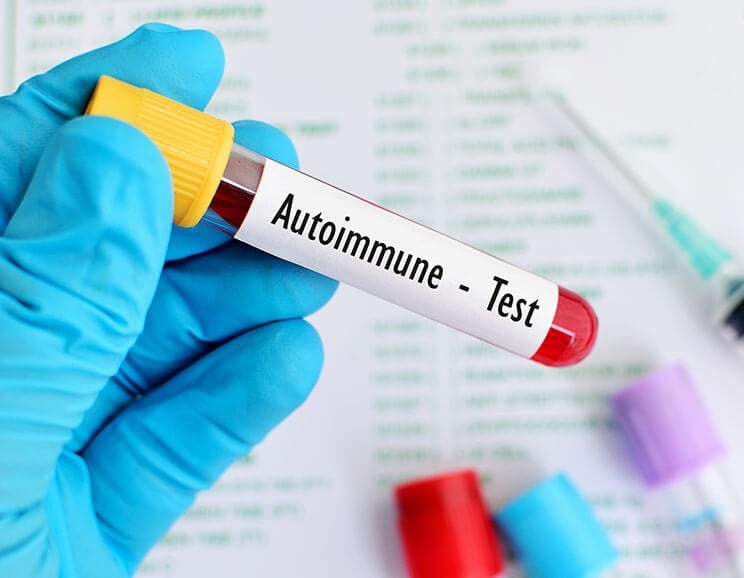Even if you haven’t been diagnosed with an autoimmune disease, you could still have one. Here’s why getting an official diagnosis can sometimes take years, and why the root cause is often hard to pinpoint.
Since symptoms of an autoimmune disease can be mistaken for other conditions, most people with an autoimmune disease will see a number of doctors over the course of roughly four years before a diagnosis is made.
While this can feel like a long and tedious process, understanding what an autoimmune disease is, how it affects your body, and the symptoms can help you advocate for yourself when speaking with your doctor. Let’s take a look at exactly what an autoimmune disease is, and what it entails.
Fight inflammation and create easy, healthy meals! We've created a FREE 7-Day AIP Meal Plan
Get Your FREE 7-Day AIP Meal Plan here.
What is an Autoimmune Disease?
An autoimmune disease is when your immune system mistakes its own cells and tissues as a foreign invader, such as a virus or other types of infections. (1) In these cases, your body will literally attack itself, mistaking healthy tissue for foreign invaders. As a result of this immune response, you can experience digestive distress, fatigue, fevers or swollen glands. (2)
The Different Types of Autoimmune Disease

There are over 100 different types of autoimmune diseases, with some being more common than others. (3)
Some of the most well-known autoimmune conditions include:
- Multiple sclerosis
- Lupus
- Crohn’s disease
- Psoriasis
- Raynaud’s phenomenon
- Ulcerative colitis
- Celiac disease
Signs & Symptoms
Telltale signs will differ depending on the type of autoimmunity you have, but nearly all kinds start with fatigue, muscles aches, and a low-grade fever. Nearly all autoimmune diseases will also present with some form of inflammation, leading to pain and swelling in different areas. (4)
In addition to generalized symptoms of feeling unwell, some of the other common signs and symptoms of an autoimmune disease include: (5)
- Joint pain
- Swollen glands
- Skin issues
- Digestive issues
Why Autoimmune Diseases Often go Undiagnosed (or Misdiagnosed)

Unfortunately, autoimmune diseases are often misdiagnosed. In fact, the American Autoimmune Related Diseases Association states that the average person suffering from an autoimmune disease will see about four doctors over a period of four years before an actual diagnosis is made. (6) With nearly 50 million Americans suffering from an autoimmune disease and waiting an average of four years to be diagnosed, it is also likely that many people have an autoimmune disease but don’t know it yet. (7)
Diagnosis is also difficult to come by because symptoms of an autoimmune disease are so generalized. Some doctors may also skip over certain tests that could potentially uncover autoimmunity. If you suspect that you are dealing with an autoimmune disease, speak with your doctor about running a diagnostic test like an ANA test, and an immunoglobulins blood test. (8) These can both be helpful tests when it comes to a proper diagnosis.
The ANA test, or an antinuclear antibody test, is the primary blood test used to help diagnose an autoimmune disease. The test looks for antibodies that attack your own tissue – a telltale sign of autoimmune conditions. When you get a positive ANA test result, this generally indicates that your body is experiencing a reaction as the result of your immune system attacking its own healthy tissue. (9)
An immunoglobulin test measures antibodies in your blood. This can be a helpful way to determine if your immune system is making different antibodies to either fight off an infection, or if antibodies are being made and attacking healthy tissue. (10)
Both of these tests can be useful tools in narrowing down an autoimmune disease diagnosis. However, they won’t necessarily pinpoint what type of autoimmune disease you have.
What to do If You Have an Autoimmune Disease
If you do have (or suspect you have) an autoimmune disease, there are a couple of things you can do to better support your overall health. First, it’s important to find the right doctor, preferably one who specializes in autoimmune diseases. Ask your family care doctor for recommendations, and inquire about how the coordination of care is handled. Specialists who commonly deal with autoimmune conditions include rheumatologists, occupational therapists, hematologists, and gastroenterologists. (11)
It’s also important to support your health with a nutritious diet and a healthy lifestyle. Let’s take a look at some of the best changes you can make right now to help manage an autoimmune disease.
Nutrition Tips

Nutrition plays a role in every single aspect of health, and the foods you eat can help your body cope with an autoimmune disease. Here are some important dietary steps you can make to help improve your overall health and combat symptoms:
Remove Inflammatory Foods
Since nearly every autoimmune disease starts with inflammation, it’s important to remove pro-inflammatory foods from your diet. Avoid sugar, gluten, dairy, soy, and all processed and fried foods.
Eat Nutrient-Dense Foods
Get lots of anti-inflammatory foods in your diet, like dark leafy green vegetables, cauliflower, turmeric, ginger, and healthy fats from avocados, coconut oil, and pasture-raised meat.
Cut out Triggers
Everyone is different, so not everyone is going to react to the same foods in the same way. However, many people with autoimmune diseases are unable to tolerate eggs, grains, yeast, and even nightshade vegetables. If you notice a specific food triggers symptoms, try removing it from your diet for at least two weeks to see if symptoms improve.
Opt for Organic
Choose organic foods whenever possible to reduce your exposure to herbicides and pesticides, which can be pro-inflammatory. You’ll also cut exposure to harmful hormones and antibiotics.
Lifestyle Tips

Get the most out of your dietary changes by making these easy lifestyle shifts as well:
Reduce Stress
Getting stress under control is another key to beating inflammation. Gentle things like yoga, meditation, walking, reading, and light exercise can all be very helpful.
Give Complementary Alternative Medicine a Try
Also known as CAM, complementary alternative medicine include things like acupuncture and chiropractic care. Many people suffering from an autoimmune disease turn to these natural modalities to help control symptoms. (12, 13)
Quit Smoking & Reduce Alcohol Consumption
Smoking and drinking can increase inflammation, and the toxins in cigarettes can certainly lead to even further complications. Quit smoking for good, and be mindful of your alcohol consumption.
The Bottom Line
If you’ve been experiencing fatigue, joint pain, or any type of inflammatory symptom, don’t ignore these symptoms – it could be a sign of an autoimmune disease. Even if you aren’t given a diagnosis right away, don’t get discouraged. Work with your doctor to figure out what’s going on, but in the meantime, don’t underestimate the power of a healthy diet and lifestyle.
(Read This Next: 10 Ways to Calm an Autoimmune Flare-Up)


 7 Feel-Good Partner Stretches for Lower Back Pain
7 Feel-Good Partner Stretches for Lower Back Pain








Show Comments